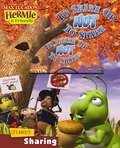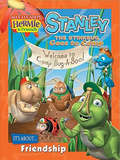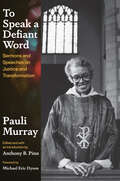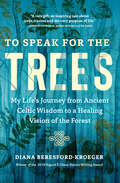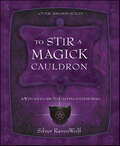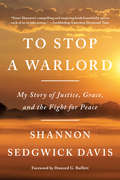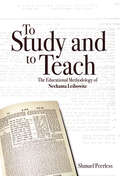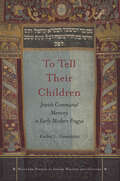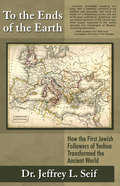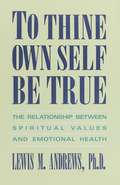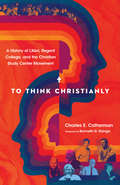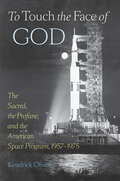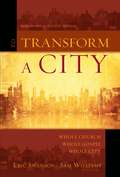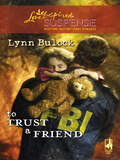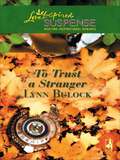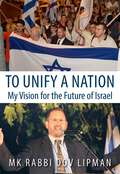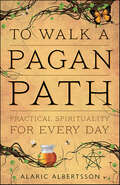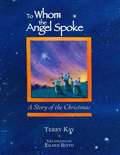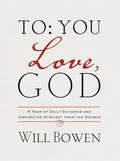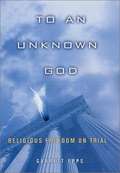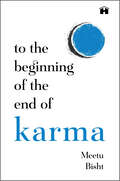- Table View
- List View
To Share or Nut To Share (Max Lucado's Hermie & Friends #7)
by Max Lucado.The garden literally goes "nuts" when a shortage of nuts causes panic, especially with the Garden Talent Show & Tell starting tomorrow. And wouldn't you know it--everyone's talent involves a nut. With only one nut left in the entire garden, friends turn into enemies as it's a mad dash to see who grabs the last, elusive nut. To remain friends and to save the show, the bugs must learn to share.
To Share or Nut to Share (Max Lucado's Hermie & Friends)
by Max LucadoThere's someone new coming to the garden's Summer Camp this year, and, well, he has a problem. He stinks. But that's what stink bugs do. So, when Stanley arrives at Camp-Bug-a-Boo, he creates quite a...well, stink. Everyone tries their best to put up with the unusual odor, but things don't go so well. But then God helps the summer camp to realize that the reason Stanley stinks is because he's afraid and the thing he is most afraid of is others not liking him and accepting him the way he is. Our garden friends soon learn that God created each of us for very special reasons and that, even though Stanley is different, they need to show him love.
To Shine One Corner of the World
by David ChadwickParaphrased from the book cover: Shunryu Suzuki has an extraordinary gift for bringing to life traditional Zen teaching in ordinary language. Here we see how his students saw him and what they remember that stayed with them when more elaborate discussions did not. He managed to put seemingly complicated ideas in short, simply statements that contained depths of understanding and compassion and often tinged with a lovely sense of humor.
To Speak a Defiant Word: Sermons and Speeches on Justice and Transformation
by Pauli MurrayTwenty-five years of writings by the religious thinker and activist Pauli Murray The religious thought and activism that shaped the late twentieth century is typically described in terms of Black men from the major Black denominations, a depiction that fails to account for the voices of those who not only challenged racism but also forced a confrontation with class and gender. Of these overlooked voices, none is more important than that of Pauli Murray (1910–1985), the nonbinary Black lawyer, activist, poet, and Episcopal priest who influenced such icons as Ruth Bader Ginsburg and Thurgood Marshall. Anthony B. Pinn has collected Murray&’s most important sermons, lectures, and speeches from 1960 through 1985, showcasing her religious thought and activism as well as her original and compassionate literary voice. In highlighting major themes in Murray&’s writing—including the strength and rights of women, faithfulness, religious community, and suffering—Pinn&’s collection reveals the evolution in Murray&’s religious ideas and her sense of ministry, unpacking her role in a tumultuous period of American history, as well as her thriving legacy.
To Speak for the Trees: My Life's Journey from Ancient Celtic Wisdom to a Healing Vision of the Forest
by Diana Beresford-Kroeger&“A rare gift: an inspiring tale about trees, trauma and the very purpose of life.&” —Andrew Nikiforuk, author of Empire of the Beetle Diana Beresford-Kroeger—a world-recognized botanist and medical biochemist—has revolutionized our understanding of the natural world with her startling insights into the hidden life of trees. In this riveting memoir, she uncovers the roots of her discoveries in her extraordinary childhood in Ireland. Soon after, her brilliant mind bloomed into an illustrious scientific career that melds the intricacies of the natural world with the truths of traditional Celtic wisdom. To Speak for the Trees uniquely blends the story of Beresford-Kroeger&’s incredible life and her outstanding achievement as a scientist. It elegantly shows us how forests can not only heal us as people but can also help save the planet.
To Stir a Magick Cauldron: A Witch's Guide to Casting and Conjuring
by Silver RavenWolfA comprehensive guide to the essentials of Witchcraft, now revised and updated.Cast. Conjure. Stir it up. Call on assistance of the five winds, cast a circle of stars, enlist the help of the nature spirits in your yard. A Witch’s world is filled with wonder and magick. It’s also filled with the hard work and dedication to learning that are part of living the Craft every day.SilverRavenWolf serves up seasoned guidance to the Craft in To Stir A Magick Cauldron, the second volume in the enormously popular Witchcraft series that also includes To Ride A Silver Broomstick and To Light A Sacred Flame. Let Silver help you rediscover the divine within the natural world, and teach you the spiritual and magickal practices needed to enjoy all that bountiful Universe has to offer. The indispensable guide presents tried-and-true Witch wisdom, dished out with Silver’s down-to-earth warmth and humor. You’ll learn the essentials of Witchcraft, including:· cauldron magick · meditations and practices for spiritual balance· the Robe of Stars ritual · the energetic importance of joy and laughter· The Dragon’s Loop and other protection spells · banishing rituals· circle casting · healing techniques · ten ways to raise power· land blessings · how to erect a shrine · trance work instruction· how to work with sun, moon, and star power · the Shrouded Supper ritual· elemental, herb, tarot, talismanic, and ritual magick
To Stop a Warlord: My Story of Justice, Grace, and the Fight for Peace
by Shannon Sedgwick DavisOne woman’s inspiring true story of an unlikely alliance to stop the atrocities of a warlord, proving that there is no limit to what we can do, even in the face of unspeakable injustice and impossible odds“This compelling and inspiring book beautifully moves each of us to take action to help the most vulnerable among us.”—Archbishop Emeritus Desmond Tutu Late one night in the summer of 2010, Shannon Sedgwick Davis, a lawyer, human rights advocate, and Texas mom to two young boys, first met a Ugandan general to discuss an unconventional plan to stop Joseph Kony, a murderous warlord who’d terrorized communities in four countries across Central and East Africa. For twenty-five years, Kony and his Lord’s Resistance Army had killed over a hundred thousand people, displaced millions, and abducted tens of thousands of children, forcing them to become child soldiers. After Sedgwick Davis met with survivors and community leaders, aid workers and lawmakers, it was clear that the current international systems were failing to protect the most vulnerable. Guided by the strength of her beliefs and convictions, Sedgwick Davis knew she had to help other parents to have the same right she had—to go to sleep each night knowing that their children were safe. But Sedgwick Davis had no roadmap for how to stop a violent armed group. She would soon step far outside the bounds of traditional philanthropy and activism and partner her human rights organization, the Bridgeway Foundation, with a South African private military contractor and a specialized unit within the Ugandan army. The experience would bring her to question everything she had previously believed about her role as a humanitarian, about the meaning of justice, and about the very nature of good and evil. In To Stop a Warlord, Shannon Sedgwick Davis tells the story, for the first time, of the unprecedented collaboration she helped build with the aim of finally ending Joseph Kony’s war—and the unforgettable journey on an unexpected path to peace. A powerful memoir that reads like a thriller, this is a story that asks us just how hard we would fight for what we believe in. 100 percent of the author’s net proceeds from this book will go to organizations seeking justice and protection for civilians in conflict zones.“This is an extraordinary memoir by an extraordinary leader—it’s impossible to read without feeling moved to do more to help those with less.”—Adam Grant, New York Times bestselling author of Originals and Give and Take
To Study and to Teach: The Methodology of Nechama Leibowitz
by Shmuel PeerlessIn this book, Shmuel Peerless, a long-time student of Nechama Leibowitz's, systematically presents the respected scholar's unique approach to Torah instruction, organizing some of her methodological teachings and pedagogical techniques in a manner that makes them easily accessible to teachers and students of textual study alike. The information provided in this volume is collected and extrapolated from Leibowitz's lectures, published writings, and gilyonot—the study sheets on the weekly Torah portion she disseminated to students worldwide. This book helps to preserve Nechama Leibowitz the teacher, the scholar, and the personality as an inspiration for future generations of teachers and students.
To Tell Their Children: Jewish Communal Memory in Early Modern Prague
by Rachel L. GreenblattThis book offers an examination of Jewish communal memory in Prague in the century and a half stretching from its position as cosmopolitan capital of the Holy Roman Empire (1583-1611) through Catholic reform and triumphalism in the later seventeenth century, to the eve of its encounter with Enlightenment in the early eighteenth. Rachel Greenblatt approaches the subject through the lens of the community's own stories—stories recovered from close readings of a wide range of documents as well as from gravestones and other treasured objects in which Prague's Jews recorded their history. On the basis of this material, Greenblatt shows how members of this community sought to preserve for future generations their memories of others within the community and the events that they experienced. Throughout, the author seeks to go beyond the debates inspired by Yosef Hayim Yerushalmi's influential Zakhor: Jewish History and Jewish Memory, often regarded as the seminal work in the field of Jewish communal memory, by focusing not on whether Jews in a pre-modern community had a historical consciousness, but rather on the ways in which they perceived and preserved their history. In doing this, Greenblatt opens a window onto the roles that local traditions, aesthetic sensibilities, gender, social hierarchies, and political and financial pressures played in the construction of local memories.
To The Ends Of The Earth: How the First Jewish Followers of Yeshua Transformed the Ancient World
by Dr Jeffrey L. SeifYou do know that the first followers of Yeshua (Jesus) were Jews. And everyone knows by now that Jews spread his message through the ministry of Paul, Peter, and the other apostles.
To Thine Own Self Be True: The Relationship Between Spiritual Values and Emotional Health
by Lewis M. Andrews"There is a newfound confidence and enthusiasm for living. But perhaps the most remarkable development of all is the recognition that this spiritual therapy is not really a new discovery, revealed by some outside authority, as much as it is a reminder of the basic truths we have always known in our own hearts. In healing ourselves, we learn that the greatest wisdom of all lies not in listening to others but in being true to our deepest selves".
To Think Christianly: A History of L'Abri, Regent College, and the Christian Study Center Movement
by Charles E. CothermanIn the late 1960s and on into the next decade, the American pastor and bestselling author Francis Schaeffer regularly received requests from evangelicals across North America seeking his help to replicate his innovative learning community, L'Abri, within their own contexts.The C. S. Lewis Institute near Washington, DCR. C. Sproul's Ligonier Valley Study Center in Stahlstown, PennsylvaniaNew College BerkeleyThe Center for Christian Study at the University of VirginiaThe Consortium of Christian Study Centers, which now includes dozens of institutionsTo Think Christianly
To Touch the Face of God: The Sacred, the Profane, and the American Space Program, 1957–1975 (New Series in NASA History)
by Kendrick OliverWas the space program the signature project of secular modernity or a symbol of humankind’s perpetual quest for communion with God?"In the beginning God created the heavens and the earth..."In 1968 the world watched as Earth rose over the moonscape, televised from the orbiting Apollo 8 mission capsule. Radioing back to Houston on Christmas Eve, astronauts recited the first ten verses from the book of Genesis. In fact, many of the astronauts found space flight to be a religious experience. To Touch the Face of God is the first book-length historical study of the relationship between religion and the U.S. space program. Kendrick Oliver explores the role played by religious motivations in the formation of the space program and discusses the responses of religious thinkers such as Paul Tillich and C. S. Lewis. Examining the attitudes of religious Americans, Oliver finds that the space program was a source of anxiety as well as inspiration. It was not always easy for them to tell whether it was a godly or godless venture.Grounded in original archival research and the study of participant testimonies, this book also explores one of the largest petition campaigns of the post-war era. Between 1969 and 1975, more than eight million Americans wrote to NASA expressing support for prayer and bible-reading in space. Oliver’s study is rigorous and detailed but also contemplative in its approach, examining the larger meanings of mankind’s first adventures in "the heavens."
To Transform a City: Whole Church, Whole Gospel, Whole City
by Sam Williams Eric SwansonTo Transform a City is a timely, compelling book that helps readers understand how to think about cities, their own city, and the broad strategies needed for kingdom impact. The book begins with an overview of the importance of cities in the new day in which we live. The authors address the process of transformation along with examples of where and how communities have been transformed throughout history. After writing a persuasive chapter on kingdom thinking the authors unfold the meaning of the whole church, the whole gospel, and the whole city. The book ends with the need for people of good faith to work together in the city with people of good will for the welfare of the city.
To Trust a Friend
by Lynn BulockA forensic specialist teams up with an FBI agent to catch a devious serial killer in this romantic suspense novel of faith, danger, and second chances.When scattered skeletal remains are found in Maryland, Dr. Kyra Elliott faces the challenge of her career. She must identify the young, female victims, and the serial killer who so brutally took their lives. Help comes in the form of FBI investigator Joshua Richards, Kyra’s old friend—and secret crush.Considered a loose cannon, Josh has been “loaned” to Kyra, and he doesn’t like it. Yet as they close in on the killer, Kyra has to trust her hostile partner with her life—and her heart.
To Trust a Stranger
by Lynn BulockA faded childhood photograph of the Barker girls was the only cluefound at a crime scene. But it didn't explain who'd want Jessie Barker'ssister dead. The snapshot brought back memories of another tragedy,shrouded in mystery, that left the Barker girls orphaned as children.Jessie had to find out what happened to her beloved sister, but she'dhave to trust a stranger with a twenty-five-year-old story that no onehad ever believed. Yet detective Steve Gardner did believe-and withGod's help he would aid Jessie in her dangerous quest for the truth....
To Unify a Nation: My Vision for the Future of Israel
by Yair Lapid MK Rabbi Dov LipmanExploring the issues of the separation between religion and state in Israel, this book by Knesset parliament member Rabbi Dov Lipman lays out his vision for the future. Lipman was elected to the Yesh Atid party, which, though largely secular, calls for a more moderate and open form of Judaism. His is a voice of reason in the religious debates and battles that have threatened to undermine Jewish unity in Israel and around the world. Lipman has observed firsthand the polarization, extremism, and discrimination that have been on the upswing in Israel, and his book examines specific practical issues rather than general theological questions in the Israeli political scene. As the only ultra-Orthodox member of the current coalition, he offers a unique insight into the internal societal struggles of the Jewish community as well as the hope for a better future for both Israel and Jews around the world.
To Wager Her Heart
by Tamera AlexanderSet against the real history of Nashville’s Belle Meade Plantation and the original Fisk University Jubilee Singers ensemble, To Wager Her Heart is a stirring love story about seeking justice and restoring honor at a time in American history when both were tenuous and hard-won.With fates bound by a shared tragedy, a reformed gambler from the Colorado Territory and a Southern Belle bent on breaking free from society’s expectations must work together to achieve their dreams—provided the truth doesn’t tear them apart first.Sylas Rutledge, new owner of the Northeast Line Railroad, invests everything he has into this new venture, partly for the sake of the challenge. But mostly to clear his father’s name. One man holds the key to Sy’s success—General William Giles Harding of Nashville’s Belle Meade Plantation. But Harding is champagne and thoroughbreds, and Sy Rutledge is beer and bullocks.Sy needs someone to help him maneuver through Nashville’s society, and when he meets Alexandra Jamison, he quickly decides he’s found his tutor. But he soon discovers that the very train accident his father is blamed for causing is what killed Alexandra’s fiancé and shattered her world.Spurning an arranged marriage by her father, Alexandra instead pursues her passion for teaching at Fisk University, the first freedmen’s university in the United States. But family—and Nashville society—do not approve, and she soon finds herself cast out from both.Through connections with the Harding family, Alexandra and Sy become unlikely allies. And despite first impressions, Alexandra gradually finds herself coming to respect and even care for this man. But how can she, when her heart is still spoken for?Sy is willing to risk everything to win over the woman he loves. What he doesn’t count on is having to wager her heart to do it.
To Walk a Pagan Path: Practical Spirituality for Every Day
by Alaric AlbertssonInspiration and Ideas for a Holistic Pagan LifestyleLive fully as a Pagan every day of the year, not only on full moons and holidays. With practical tips for integrating earth-centered spirituality into every aspect of life, To Walk a Pagan Path shows you how to:Cultivate a meaningful Pagan practice by following seven simple steps.Develop a sacred calendar customized for your beliefs, lifestyle, and environment.Make daily activities sacred with quick and easy rituals.Reclaim your place in the food cycle by producing a portion of your own food—even if you live in an apartment!Express Pagan spirituality through a variety of craft projects: candles, scrying mirrors, solar wreaths, recipes, and more.Create sacred relationships with animal familiars.
To Whom the Angel Spoke: A Story of the Christmas
by Terry KayPeachtree Publishers: “To Whom the Angel Spoke is the story of three shepherds who are as different as men can be. One night, those men hear a voice, and because they believe the voice’s words about the birth of Jesus, they become alike. In author Terry Kay’s moving story, the unifying power of simple belief transcends differences, reminding us that, as diverse as we are, there is a celebration that can bring us all together.”
To Win Her Favor: To Whisper Her Name, To Win Her Favor, To Wager Her Heart, To Mend A Dream (A Belle Meade Plantation Novel #2)
by Tamera AlexanderA gifted rider in a world where ladies never race, Maggie Linden is determined that her horse will become a champion. But the one man who could help her has vowed to stay away from thoroughbred racing forever. An Irishman far from home, Cullen McGrath left a once prosperous life in England because of a horse racing scandal that nearly ruined him. He’s come to Nashville for a fresh start, hoping to buy land and begin farming, all while determined to stay as far away from thoroughbred racing as possible. But starting over proves harder than he’d wagered, especially when Maggie Linden’s father makes him an offer he shouldn’t accept yet cannot possibly refuse. Maggie is certain that her mare, Bourbon Belle, can take the top purse in the inaugural Peyton Stakes, the richest race ever run in America. Maggie only needs the chance to prove it. To give her that chance—and to save Linden Downs from being sold to the highest bidder—Maggie’s father, aging, yet wily as ever, makes a barter. His agreement includes one tiny, troublesome detail––Maggie must marry a man she’s never met. A man she never would have chosen for herself.
To You; Love, God
by Will BowenEmbrace God's Love Every Day What if God sent you a personal, daily message to remind you that he is present, that he loves you, and that things are going to work out? Will Bowen's To You, Love God is a collection of life-changing messages straight from the source. Simple yet deeply moving, this 365-day devotional speaks to you directly with the wisdom, love, and compassion of God. Will Bowen is an ordained minister, sought after motivational speaker, and author of the international bestseller, A Complaint Free World, among other books. He lives with his family near Kansas City, Missouri. Begin each day with a deep awareness of God's presence: Come with me. I am walking just ahead of you-always in sight, never more than a pace or two ahead. Here I am. Take my hand. I have amazing things to show you. Love, God Reader testimonials: What a gift-sort of a "spiritual vitamin" to start each and every morning. Some of the messages are so profound that they have found their way laminated and into my wallet or on my desk where I can see them every day. -M. Manard, Gladstone, MO I really feel like I am talking to God when I read them every morning. You have so helped me. -M. Clesi, Boca Raton, FL The devotions lift me up beyond the daily dramas, always pointing up towards the Light and Truth that never changes.-S. Farrow, Vancouver Island, BC On many occasions the messages are exactly what I need that day. Recently I have been sharing them with my teenage daughter and she loves them! -S. Garland, Kansas City, MO I can't tell you how much "To You, Love God" has meant to me. I read your inspired messages every morning, and what a beautiful way to begin the day. They give comfort, peace, and insight into experiencing the life God wants us all to experience. -J. Westhoff, Green Valley, AZ These messages are the backbone of keeping my attitude positive, and helping me learn to accept others and myself as beings created by God. -P. Loffstrom, Zinga, Tanzania The messages of "To You, Love God" have inspired and sustained me through some of the most difficult times of my life including a divorce and the recent sudden loss of my daughter.-C. Pizzi, Calabash, NC "To You, Love God" inspires me, makes me think, and most importantly, helps me appreciate all the blessings that come my way. -D. Kelley, Clifton Park, NY I read these daily letters from God after I pray and meditate. They seem to be written directly to me each day. -E. Ruppert, Delray Beach, FL I count on starting my day with the wisdom of "To You, Love God." - S. Prince, Long Beach, CA I look at life differently than I did before. Gone is the "poor me" attitude. - K. Hill Morristown, TN They are always inspirational and often "spot on" as to what happens to be going on with me in my life. Very uncanny! -T. Penkala, San Diego, CA
To a Tea (TeaRoom Mysteries #3)
by Vera DodgeBusiness is booming at Tea for Two, so cousins Elaine Cook and Jan Blake decide to hire more help. When Elaine interviews a dapper Englishman with a résumé full of important jobs around the world, she can't help but wonder, Why does he want to work here? As the tearoom readies its first wedding, Elaine's concerns are quickly overshadowed by the groom's sudden disappearance. Cold feet or foul play? The distraught bride turns to the cousins, who spring into action to find the missing groom. To make matters worse, a local bank is robbed. Could the two incidents be related? Elaine and Jan set out in different directions to solve the mystery--even taking Jan to the town's biker bar! Before long, it becomes clear that the cousins are unraveling the same thread from different ends. The question is, will they meet in the middle? Mix together one stately Victorian home, a charming lakeside town in Maine, and two adventurous cousins with a passion for tea and hospitality. Add a large scoop of intriguing mystery and sprinkle generously with faith, family, and friends, and you have the recipe for Tearoom Mysteries.
To an Unknown God: Religious Freedom on Trial
by Garrett EppsThe people and issues behind a Supreme Court Case.
To the Beginning of the End of Karma
by Meetu BishtYour journey to understanding and ending karma begins here.Karma, a subject that has intrigued, mystified, and often instilled fear, continues to shape our lives in profound ways. Its complexities often leave us searching for answers and solutions to its seemingly unbreakable grip. But what if there is a way to break free from this cycle?After her widely acclaimed books Living Spirituality and Why We Are Who We Are, Meetu Bisht once again reimagines an ancient concept for today&’s seekers and offers a refreshing and actionable approach to understanding and tackling karma at its roots. With practical insights into relationship karma, money karma, health karma, and more, the author redefines the workings of karma in the context of modern spiritual needs, providing a growth-oriented and nuanced perspective on the math of cause and effect.All in all, To the Beginning of the End of Karma serves as a guide to reclaiming control and transforming karmic burdens into opportunities for consciousness ascension and liberation.
